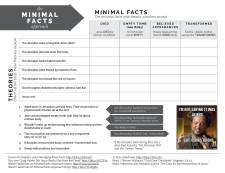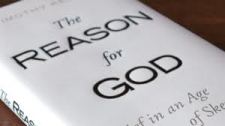Sin/evil is co-creating (exercising free will) apart from God (love). We are able to do this because we are made in the image of God. What we are supposed to do with free will is love (defined by God) freely.
An excerpt on sin from my “faith vs. works” thread:
In the history of philosophy there have been many attempts to define happiness, even to set it as the ultimate good. The question of happiness is one of what really matters, and that we experience a loving relationship with God and eachother is what really matters*. Happiness – a better word for it might be “blessedness” – is not “an emotion often dependent on outward circumstances,”** and it “refers to ultimate well-being and distinctive spiritual joy.”** Another way to describe the state of happiness or blessedness is as the peace of God – “not merely a psychological state of mind, but an inner tranquility based on peace with God”***. Miss Marshall says there is no quick fix toward happiness, but those who get right with God know that this happiness is granted in a defining moment, whereas good choices, rather than being a path to happiness as Marshall argues, are the output of a person who is already at peace with God. True happiness is not earned by good acts, but accepted by faith. Concepts labeled happiness which don’t fit the above definition are rooted in the temporal and so can be diminished by the trials and hardships of this life. Experiencing the not always rewarding feeling produced by Golden Rule^ choices is not the same as the spiritual joy, the inner tranquility, the well-being which motivates those choices even in the midst of adversity.
* See Mark 12:28-31; Deuteronomy 6:5; Leviticus 19:18; Romans 13:8; Galatians 5:14
** Excerpt from study note on Matthew 5:3, Zondervan’s NASB Study Bible, 1999.
*** Excerpt from study note on Philippians 4:7, Zondervan’s NASB Study Bible, 1999.
^ See Matthew 7:12*
I also touched on ‘sin’ in the same thread:
Jesus (God the Son) laid down His life on the cross (John 3:14-16) as an act of eternal, unconditional love for every soul (John 12:32), settling, once and for all, our debt of death (Hebrews 10:1-18), which is the consequent of sin [violating the royal law of Love (Lev. 19:18; Deut. 6:5; Matt. 7:12, 22:39; Mark 12:31; Luke 10:27) – Rom 3:23, 6:23]. This is how God shows us that He loves us no matter what (1 John 4:9, Romans 5:8). He rose from the dead, defeating death, and He promises eternal life to those who accept it: John 3:14-16; 1 Cor. 15:3-6; 1 John 5:11-13. This is the Music we dance to.
Sin is the obstacle of happiness (happiness, ultimately, being realized in oneness with God) – it separates us from God. Getting rid of sin is essentially righting a wrong, ending separation from God, bringing us back to oneness with God – atonement. This understanding was developed using OT sacrifices and Jesus’ NT sacrifice – communicating that it is God who provides the means of atonement – it is He who rights the wrong and brings (in my case, yanks) us back to Him. If we reject that, we reject Him. If we reject Him, we reject Love, Truth, and Life.
To Sartre, I would’ve said that to sin is to act or not act in bad faith (James 4:17). Not acting includes not helping someone who needs help, because our idols take priority (Matt 25:31-46; this passage also defines sin against God). Note that the concept of “switching perspectives” (was this a concept Nietzsche supported… or just someone with whom I used to play poker?) is covered by the Golden Rule, as you would want someone to put themselves in your shoes when considering how to behave with you. Sartre denounces private virtues as “belonging to someone with an uneasy conscience,” and I concur, except in the case of those without conscience, who mislabel their interests as “virtues”. So, while Sartre supports subjectivism, in that he sees man as the originator of value, he also undermines it, by dismissing private virtues (refer to the relativist fallacy, and consider the phrase ‘subjectivist fallacy’). In my thread on Dawkins’ “meme” I point to the reality that some values, temporal and finite, originate from man (subjectivity), but God’s values are eternal and unchanging (and we can subjectively choose His values, which brings us to Keirkegaard’s “Subjectivity is Truth” – not that I’m totally in his camp).
The English word sin derives from Old English synn., recorded in use as early as the 9th century.[1] The same root appears in several other Germanic languages, e.g. Old Norse synd, or German Sünde. There is presumably a Germanic root *sun(d)jō (literally “it is true”).[2] The word may derive, ultimately, from *es-, one of the Proto-Indo-European roots that meant “to be,” and is a present participle, “being.” Latin, also has an old present participle of esse in the word sons, sont-, which came to mean “guilty” in Latin.[citation needed] The root meaning would appear to be, “it is true;” that is, “the charge has been proven.” The Greek word hamartia (ἁμαρτία) [ Ichthus: Strong’s 2403 in Hebrew, 264, 266 in Greek ] is usually translated as sin in the New Testament; it means “to miss the mark” or “to miss the target” which was also used in Old English archery. …
“Sin” was also the name of the Babylonian moon god. Some students in recent times have postulated a connection with the modern English word “sin”[citation needed], but this is likely a folk-etymology.
– found on Wikipedia
What is the mark (or the point) referred to above that has been missed (Romans 3:23)? –the glory of God, the way humans were intended to be. The glory we had before sin poisoned the well, is restored by Christ’s sacrifice (Heb 2:5-9). When we sin, we become “alienated from ourselves, each other, our environment and ultimately from the ground of being itself,” as felix dacat mentioned.
*If God knew all, he should have taught people about things like sanitation, micro-biology, etc. And not just commanded them to conform within some sort of quasi-mundane-ritualism…
– Dan
Without the microscope and the technology which progressed to it, they would not have understood even if He did teach them about microbiology. The uncleanness typified sin, and how the uncleanness was dealt with made them distinct from their pagan neighbors, rather than leaving a vacuum to be filled by their pagan neighbors’ fertility cults, which involved temple prostitution, child sacrifice, etc.. There is a lot we have left to learn about the universe. If God were to reveal it all to us now (assuming we’d be able to recognize all the information given in the revelation), many of us would wish He had let us find out for ourselves. Discovery is a gift. If one wants to know more than one has access to with the current theories, and one is following God – all one needs to do is ask, and God will lead him/her in the right direction… Most importantly: if someone wants to make things right between you and them, do you whip out a human biology text and start talking about cytotoxic T cells?
Basically, “free will was the cause or mechanism which led to sin.
– Dan
The point is love, but without the option to sin (miss the point), love (voluntary) is impossible. The choice is not in the past… we are presented with it every moment. You mention “a sense of accomplishment, a sense of security, a sense of gratification” when a Christian freely chooses love – and I refer you to what I’ve written above regarding happiness. You mention “the price paid is life itself” – yes. My old life is dead. Good riddance.
http://www.answers.com/sin
Quote:
1. A transgression of a religious or moral law, especially when deliberate.
2.Theology.
A- Deliberate disobedience to the known will of God.
B- A condition of estrangement from God resulting from such disobedience.
3. Something regarded as being shameful, deplorable, or utterly wrong.
intr.v., sinned, sin•ning, sins.
1. To violate a religious or moral law.
2. To commit an offense or violation.
Jesus’ death [ by crucifixion ] was the epitome of Christian legacy: to destroy the physical, to gain the metaphysical. To destroy the immoral, to gain the moral. To suppress the carnal, in order to set free the unnatural. …
[ Ichthus: observe the ol’ switcharoo — ] Expect nothing less but mechanistic result from all animals. It’s only disturbing if you mistake any of them for “human”.
– Dan
You, anchored in the physical universe, a biological human, are subject to many mechanisms beyond your control. This is disturbing only if you desire more control than you will ever realistically, naturally have.
The point of Jesus’ sacrifice (and the OT sacrifices) was not to destroy the physical to gain the metaphysical – it was to point out how precious our lives are – to point out how sin messes it up – and to point out how God restores us to a loving relationship with Him (true life) even though we mess it up.
Sin is marketed as moral “independence” though some may view it as “independence from morality” – on that note, as to the moral/immoral, natural/unnatural aspect of what you said – here’s this:
A reference to natural laws reminds me of C.S. Lewis’ “Mere Christianity” wherein he mentions that the moral law (the law of love) is not one we naturally follow… which reminds me of Dan’s mention that Christianity tries to destroy the natural. But, while I agree in principle with C.S. Lewis, I don’t think God’s law (of love) is unnatural. I think it is what nature is created for, but nature has been corrupted — the well poisoned (and forgiven, depending on which side of the faith-fence you are perceiving from). It is unreasonable to call anything you experience unnatural, because if it really were, it would not be experienced in the natural universe. Therefore, supernatural does not equal unnatural — it means there is more to nature than our conceptual frameworks have allowed for previously. I think it was also Dan (or was it Nietzsche, I just skimmed him recently?) who said Christianity gave “world” a negative connotation. But that only applies to one use of the word “world”. He left out that God so loved the world… (John 3:16). The “world” with a negative connotation is the one that sets itself against the law of love (God) (that is the “world” that hates those who follow God… the law of love… but, though God is not “of them” — He still loves them).
I reviewed Nietzsche’s “The Religious Mood” and “The Natural History of Morals” from “Beyond Good and Evil” (contained within an anthology I can’t toss out because, a) it doesn’t belong to me, and b) it contains work by authors which I’d hate to throw out) — and here is my short answer — The law (which reveals sin, though sin existed before it) was not given to enslave us, it was given to those who had been set free by God (read Exodus), to those God intended to be free and to freely follow the law (of love) (hence free will) with the goal that it would become written on our hearts (Jer 31:31) and followed out of love for it, with His strength (Rom 6:14, 16-23; 7-4-6, 14-25; 8:1-15) – for we are all too weak to love (uncorrupted love) on our own (and we were never meant to). On our own, we adapt love into what it is not (still perhaps calling it love, though it isn’t, or feigning to abandon it altogether, though we cannot). That pretty much sums up sin.
If that bums ya out, go back up and read the happiness part.









